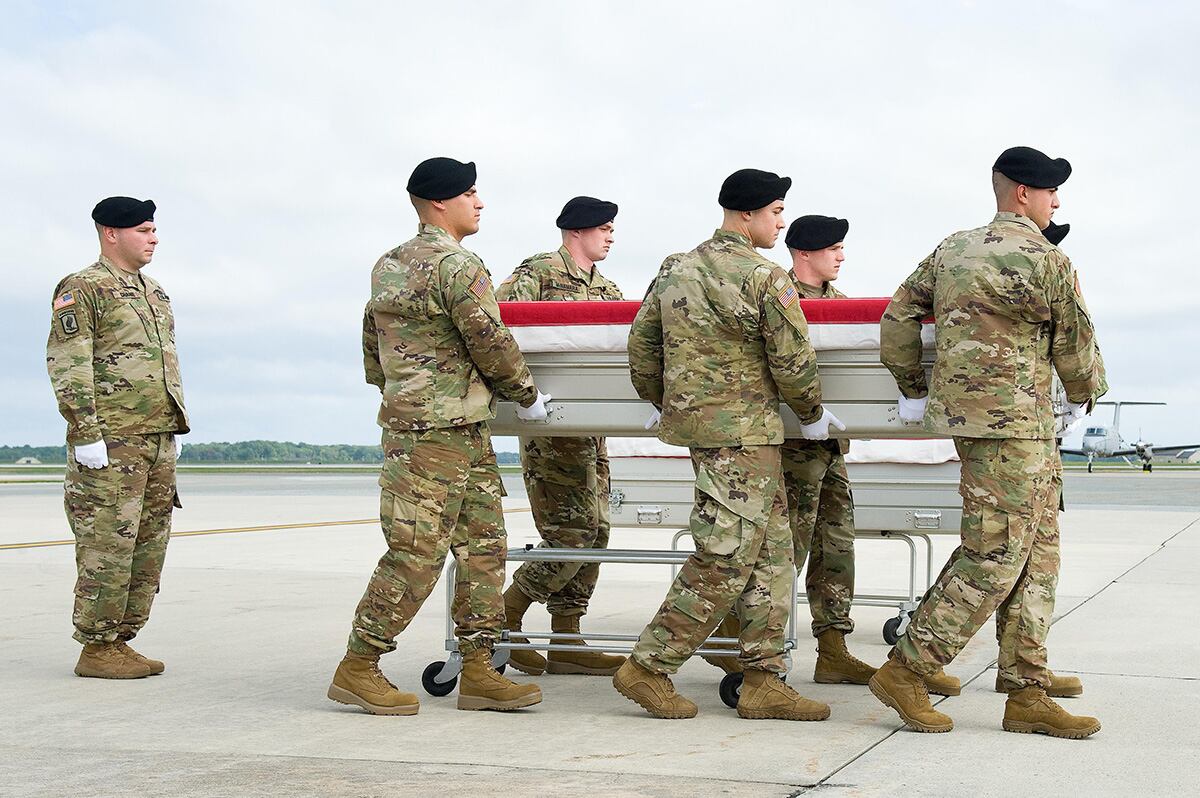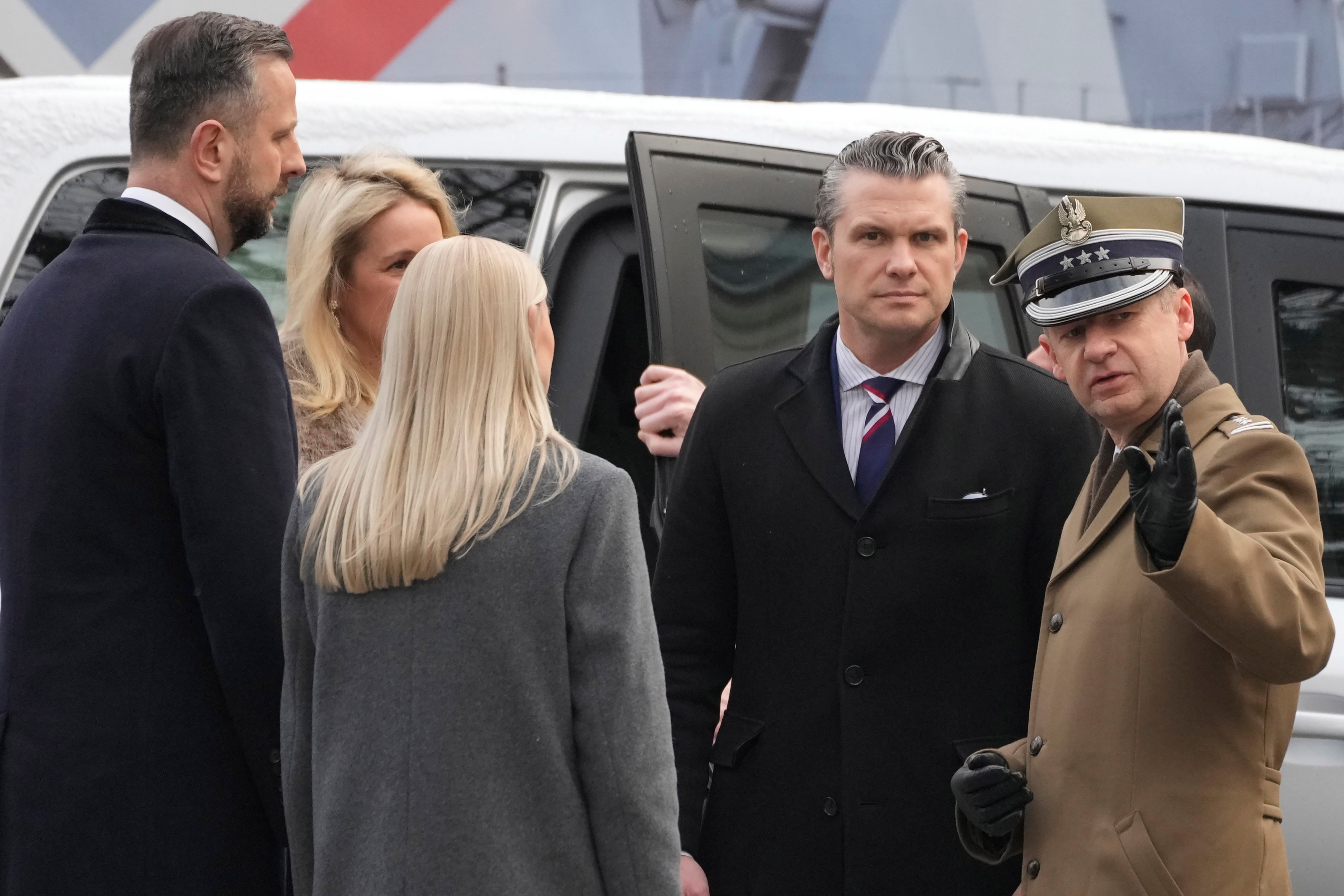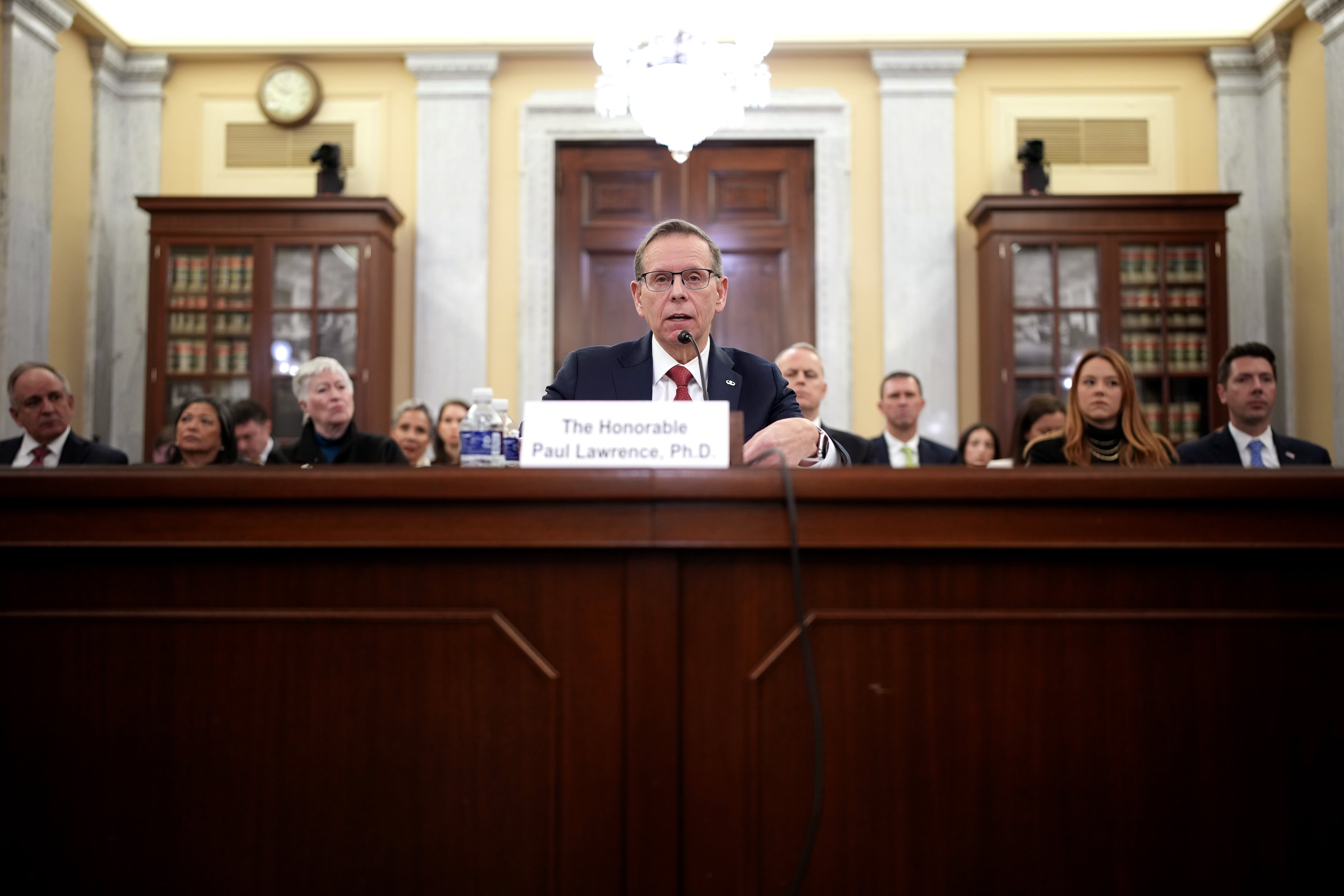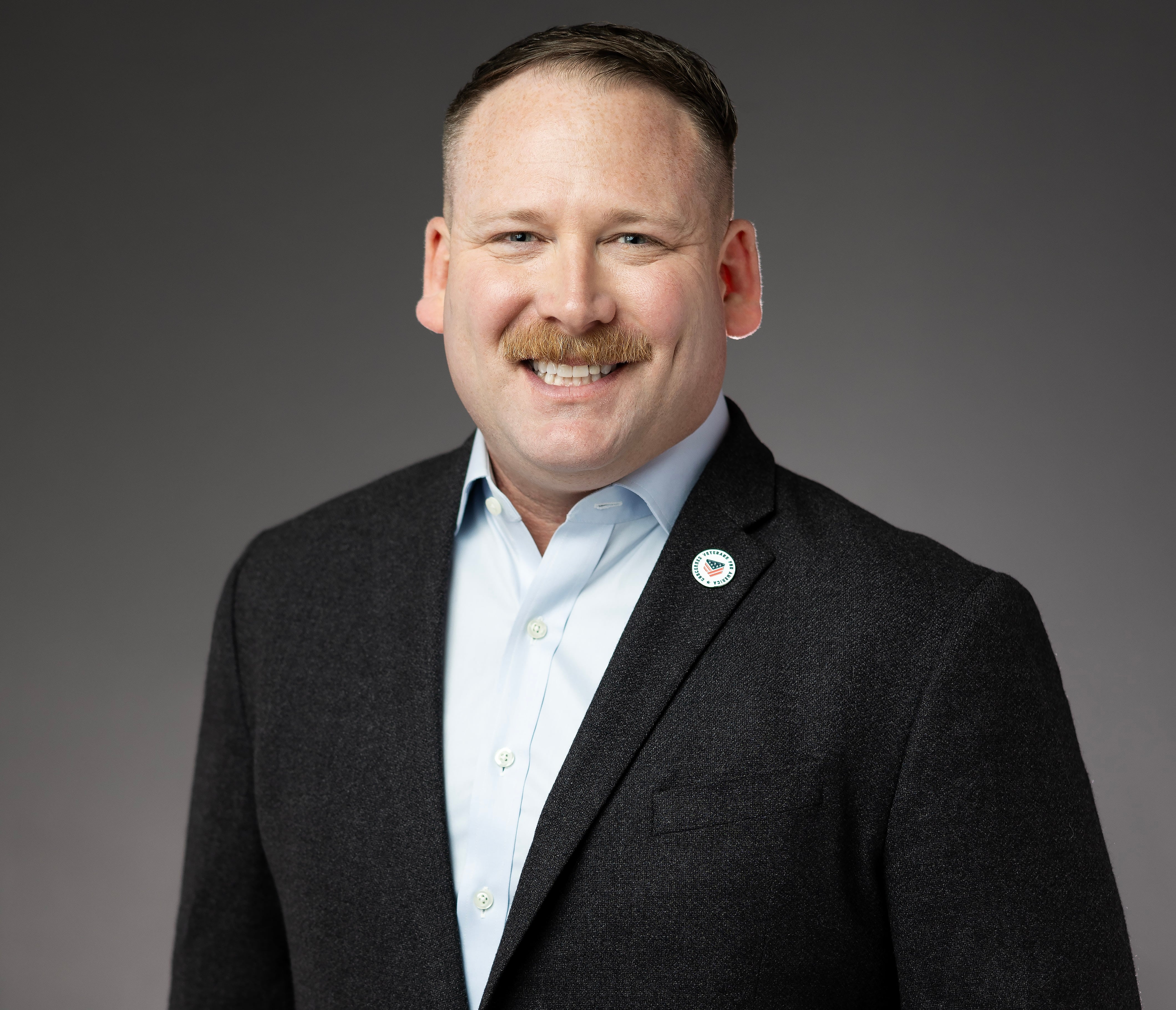Editor’s note: The following is an excerpt from the book “Fallen Among U.S.”
Philadelphia International Airport, Pennsylvania
July 18, 2016
I LANDED IN PHILADELPHIA and was scheduled to meet a Major from the mortuary command. I’d potentially be traveling around the globe and escorting remains back to the U.S., as well as handling any media queries related to the war remains. But all I could think about was that I wouldn’t get to see my family for a longtime — six months — or for as many months as my youngest daughter was old.
I actually had to sign paperwork stating that I wouldn’t see my family more than 24 out of the 180 days of my deployment, and all because of an arcane military regulation prohibiting deployed members — even those who would be stateside at times — from visiting with their families. It was enforced for any number of reasons, including avoiding the inherent distraction of family life, and for it I would receive an extra $250 a month in my paycheck called “Family Separation Pay.” I couldn’t even refuse this pittance and requirement if I wanted to, which I did.
The night before I left, I kissed my wife and two small daughters ‘goodbye,’ and then drove to my base at 2 a.m. A Unit Deployment Monitor (UDM) met me at the base at 3 a.m. and escorted me to the airport. It was ridiculous, because we both lived near the airport and we still had to drive to base. The military loves its procedures. We waited for a big blue bus and once it arrived we were the only passengers headed to Bradley International Airport outside of Hartford, Connecticut — the closest airport to my military base. And closer still to where we both lived!
My UDM, which was the acronym commonly used, basically helped me prepare for my deployment and then saw me out the door. We had to take the bus and she had to escort me because I guess some folks dodged their deployments or something at the last minute, preferring military prison to serving their country. My UDM was a thin, 30-something, and at the rank of Senior Airman, or four rungs up from the bottom of the enlisted ladder, she had been more capable than her junior rank might’ve suggested. She was a UDM superstar.
So, I didn’t complain to her; I just enjoyed the last bit of company from home before I would go off alone on a deployment. As an Air Force Captain, I had 16 years of military service with many of those years in the Reserves, and in my career field of public affairs it wasn’t uncommon for me to deploy alone. Especially since my deployment was stateside supporting a global mission command based in Delaware, but with more or less a satellite in Ramstein, Germany. Dover and Ramstein are Air Force bases that act as the hub of mortuary transport. Smaller planes bring bodies from all over the world, usually to Ramstein, and then their flown to Dover on C-5 or C-17 aircraft. There’s also a Pacific passage for Fallen, but Dover is the main destination.
I flew to Philly in some regional airliner, and by the time I reached I was wired if only on a couple hours of sleep. Deep down inside, I was scared shitless that I would see a dead body and faint on the spot, but I was also expected to perform as a military officer and leader.
Outside the airport, I received a text instructing me to look for my contact near the airport’s parking garage, and that he’d drive me the hour or so to Dover. I knew his name, and at the time I’ll just say he was a Major who would give me mixed feelings. He outranked me by one rank, and he was easy to spot in the parking area because he was the only other person wearing a military uniform.
I spotted the gold oak leaves, which indicated his rank as a Major, and who knows if he spotted the two dark blue bars connected by dark blue lines that indicated my rank as a Captain. They call them railroad tracks because my rank was the last stop on the junior officer line before crossing the tracks into senior officerhood.
With 16 years in, I had spent about 10 of those years in the enlisted ranks before earning a commission and spending the last 6 years as a manager, or leader, in the officer ranks.
The Major was standing tall in his uniform and he smiled and waited for me to render a salute. I did. He was a late-30s African-American dude from Down South with an easy smile.
“Welcome to your deployment.” The major said something like that before he returned my salute. Then he did something peculiar: He switched to the correct side before we started walking — something about the highest ranking military person being on a particular side when walking beside someone of a lower rank, but I couldn’t remember which side now even if I tried.
I didn’t know him then, nor did I know it at the time because he had just driven over an hour to pick me up and was about to drive another hour back, but he would become ‘Major Lazy’ to me in the coming weeks, among other and perhaps more flattering names I would come up with for him in my head.
At 40, I was older than the Major. But rank is rank. That would be my world for the next six months. Listening to people solely because they outranked me, and watching as others listened to me because I was an officer and outranked them. You see, there is a big difference between military Reserve and the active-duty military. They live in a constant military culture, and I only lived in it when I chose to, or during mandatory training in the Reserve. I served one weekend per month and two weeks per year. And I usually scheduled it around when my “real life” allowed. But now this was my “real life.”
The Major wasn’t all that bad. I just thought he was lazy because I never saw him do much work other than completing a military course, and to tackle the things he was assigned by someone who outranked him. Me, somehow, I would garner the strength to take a lot of initiative and to do more than was expected of me. It all started when I arrived at the airport, wired, even with very little sleep.
Maybe, too, it was because this was my second deployment. I’d been on one with the U.S. Navy close to two decades earlier. The first deployment was when I was a Sailor aboard a nuclear-powered aircraft carrier — the U.S.S. Theodore Roosevelt — deployed to Kosovo and to the Middle East for six months. During that deployment, I spent a total of 12 days on land over a 180-day stretch. It was brutal. Draconian. Noisy. Scary at times. Like the morning when I tried to walk onto the ship’s mess decks for breakfast and got stopped so that bodies from an earlier accident could be stored in the warehouse-sized space below deck, where all the food was also refrigerated. Or the time when I had to fly in a helicopter with an admiral between two ships in our battle group — a nautical convoy spread out over many miles. I was the admiral’s speech writer and photographer, and he was going to check on the troops in our battle group aboard another, much smaller vessel than the aircraft carrier. Not only was the ride harrowing, especially when the aircrew started it out by saying — “If we crash…” But landing the helicopter on the back of that vessel in strong winds at sea made my then-short life flash before my eyes. Even the admiral was sweating!
This latest deployment, though, was six months at Port Mortuary — nice lodging, food, freedom to travel Delaware when I wasn’t on duty — and I was dreading it and longing for 168-straight days at sea again.
The first thing we did when we arrived at the mortuary command was participate in an “Orientation.” Now this is not what it sounds like. It wasn’t some sort of indoctrination; instead, it was simply a tour to familiarize me with my new home for the next six months. One of the low-hanging fruits of my job as a public affairs officer was to supervise or show around distinguished visitors who wanted to see what they could of the mortuary’s operations. I called them ‘Ghoulish Guests’ in my head. The mortuary’s Public Affairs Office insisted on describing the visits as ‘Orientations,’ instead of as ‘Tours,’ and the only justification I was given for that word-choice preference was that “Orientation sounds more respectful,” or so said a long-standing civilian employee in the office who I called Miss P.A. — for “Passive Aggressive.”
Either way, people from the outside were still walking around and gawking — maybe even looking for a dead body or two to roll by on a gurney clutching a riffle and wearing military fatigues or something — and it wasn’t my favorite part of the job to be around them.
I didn’t know it then, but there would be a lot of dead bodies, more than 29 cases of assisting in the repatriation of our Nation’s Fallen during my time at the mortuary. There would also be a lot of orientations, or easily dozens. And there were even historic ‘Dignified Transfers,’ or ‘DTs:’ such as the return of a fighter pilot who had been missing for a decade; the repatriation of what was believed to be the remains of 13 Tennessee volunteers who died during the Mexican-American War; and a few other high-profile DTs — or the solemn return of Fallen service members to the U.S. under much media attention.

One historic DT wouldn’t happen until more than a year after my deployment had ended, but the national-TV news about it would get my attention and transport me right back to the mortuary. I could recall the steps in the process because I’d led so many orientations when I was deployed there. The particular historic DT was the remains of the first bodies to be delivered by North Korea after the Korean War. They had been lost for sixty years or so and now their loved ones could finally put to rest their long-lost siblings, spouses, children, and so on.
Not by fault of the military, but in the gory fog of war everyone’s body doesn’t always get brought back home heroically under a flag-draped gurney. Some bodies sink into the mud, face down, and are lost or forgotten there. But with this new news — for some — not forever.
After the TV news reports, and the media display of ongoing talks between the White House and North Korean officials that more bodies would be returned, I began to hope, and to dream about that possibility. I know first-hand how important it would be to the families.
So, even months after returning from my life among the dead, I was brought back to the military’s mortuary in mind, heart, and spirit — and I began to hope for them and all of the Nation’s Fallen who had been left behind where they fell in battle. If they could speak, many if not all of the dead would demand to be brought back home.
But the truth in the case of North Korea and many other forgotten fields of battle — is out of the thousands of lost U.S. Korean War remains, we’d probably only get back a couple hundred, maybe a thousand — total — and the rest would be left to the flora, fauna, and mud forever.
Dream Log…
1 The Knolls, Sentosa Island Singapore
Tuesday, June 11, 2018
I KNOW EVERYONE THINKS I’M A DICK, but at least I’m not a dictator!
This guy I’m about to meet, on the other hand, would bomb the Capella Singapore hotel if they didn’t make his bed up right. Not me — I’d just sue them! It’s the American way! I don’t have to hit you to make you feel the sting of my wrath — that sting will go away—but not so if I hit you with a lawsuit.
But no one is getting sued today. Today is for the history books — to write within the margins something great, and to hopefully push outside of the margins all the ‘dick-like’ things I’ve done before and so far during my presidency, even though that probably won’t happen in the fake-news media!
Anyway, I’m about to go into this meeting with this little North Korean dic-tator, and I’m gonna make him give us back the bodies of our fallen!
It’ll be great!
Trust me!
ONE YEAR AFTER MY DEPLOYMENT, I completed a memoir about my six months working at the military’s mortuary — and the many stories of fallen I experienced first-hand, or learned about from the workers who serve there on a permanent basis. I wrote the book to exorcise the demons in my head, which really are only bad memories I find too difficult to forget.
In addition to receiving mental health counseling immediately after returning home, the book afforded me escape through cathartic expression by facing down my demons in order to understand how I might live without them — or the lingering and adverse effects of having served in one of the most emotionally-draining places in the U.S.
Perhaps as more time passes, I will put the memories, and the book, to rest on a shelf. But I’m not there yet. Triggers resurrect those demons still to this day. So, I guess, in a sense, I’m still living my life among the dead.
Andre Bowser is a spokesperson for the U.S. Department of Veterans Affairs, and a captain in the Air Force Reserve. He lives in the Northeast with his two daughters, and cat D.O.G.





